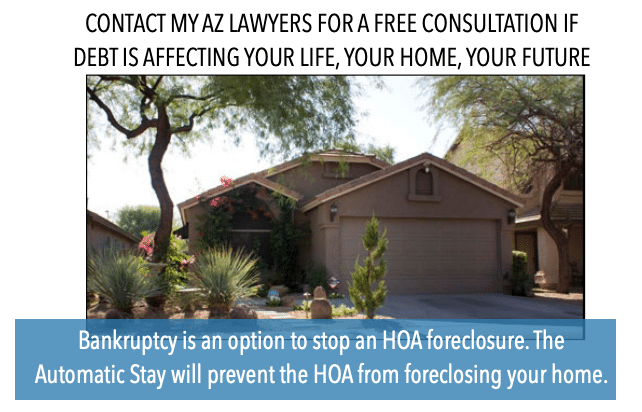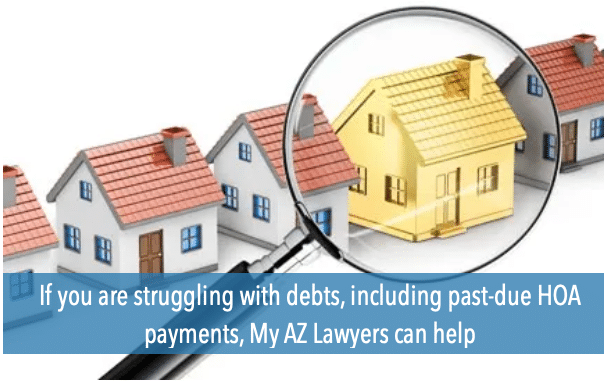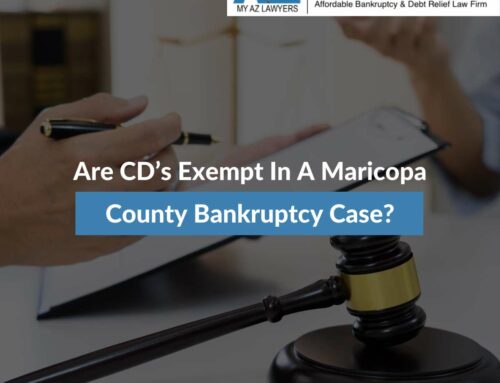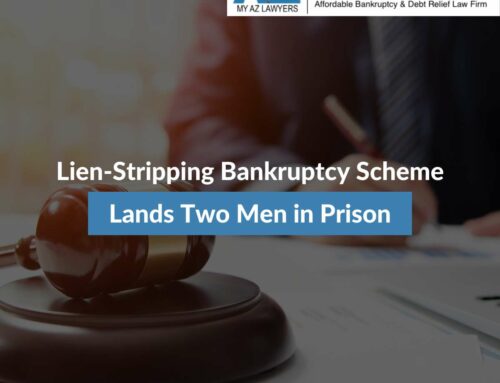Bankruptcy and HOAs
Are HOA fees dischargeable?
A Brief Bankruptcy Overview
Each chapter of bankruptcy allows filers to address their debts in different ways. Most personal bankruptcy filers choose between an Arizona Chapter 7 Bankruptcy and an Arizona Chapter 13 Bankruptcy. Chapter 7 discharges most unsecured debts like credit cards and medical bills. Debts do not require repayment, and the case will last 4-6 months. A Chapter 13 on the other hand is a reorganization of debts into a 3-5 year repayment plan. Filing either chapter instantly activate the Automatic Stay of Protection. When this stay is in effect, your creditors can’t collect on your debts through a wage garnishment, a foreclosure, or repossession.
HOA Liens
Your monthly HOA fees go towards maintaining your building or community. If you fail to pay these dues, the HOA can put a lien on your home, which can eventually lead to a foreclosure sale. If it gets to this point, you only have a few options to save your home.
First of all, you can pay the full balance. However, the HOA may have added penalties like late fees, interest, and legal costs. If you were already behind on your HOA payments, this likely isn’t a feasible option for you.
Secondly, your HOA may be willing to accept less than the full balance they are demanding. The chances of this aren’t great, but the worst they can say is no.
Third, you may be able to negotiate a repayment plan with your HOA. You will still need to pay your current HOA payments in addition to the past-due balance.
The HOA will not be able to proceed with the foreclosure without proper notice given to you and other procedures. This will give you the opportunity to defend your position. Perhaps you think you owe less than the HOA claims, or the HOA isn’t following applicable state law.
Your last option to stop an HOA foreclosure is by filing bankruptcy. The Automatic Stay will prevent the HOA from foreclosing your home. However, your HOA may file a Motion for Relief from the Automatic Stay. If the court grants this motion, the HOA will be able to proceed with a foreclosure sale. This option is best for those who have many debts that need addressing besides HOA dues.
HOA Fees in a Chapter 7 vs. Chapter 13 Bankruptcy

In a Chapter 13 Bankruptcy, debts are consolidated into one monthly payment. Your past-due HOA fees will be spread out over the 3-5 years. Therefore, this makes catching up more affordable, and filers are protected by the stay for the 3-5 years that their plan lasts.
Pre-Petition and Post-Petition Debts
When filing bankruptcy in Arizona to deal with HOA debts, it is important to understand the difference between pre-petition and post-petition debts. Pre-petition refers to debts that were incurred before your bankruptcy petition was filed. Post-petition, as you may have guessed, refers to debts incurred after your petition is filed. Many bankruptcy filers mistakenly believe that their post-petition HOA dues can be included in their bankruptcy. Only pre-petition debts are dischargeable in bankruptcy.
If you are struggling with debts, including past-due HOA payments, our office can help. We offer free consultations so you can discuss how your HOA dues will be affected by bankruptcy, along with the rest of your debts. When you’re ready to get started, we’re ready to help. Call our Arizona Bankruptcy Attorneys today for more information regarding HOA Fees and Filing for Bankruptcy in Arizona. We offer free consultations and debt evaluations. Call (480) 833-8000.






